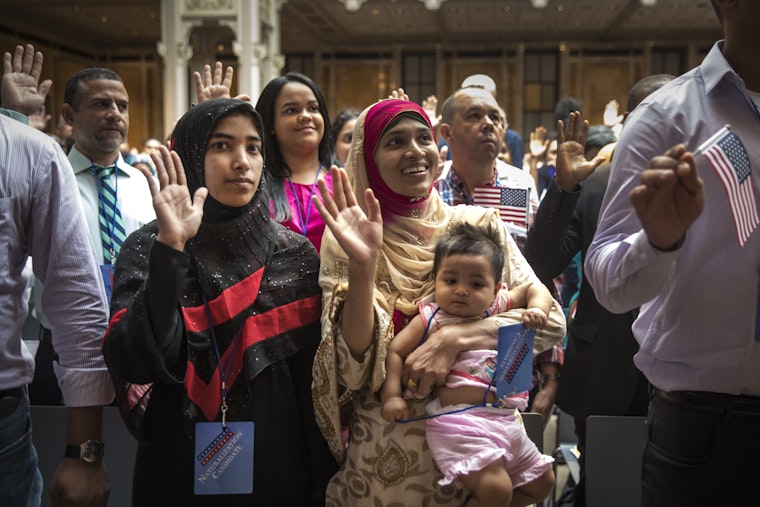A Looming Threat to Equal Citizenship in America
By Laura Bingham & Natasha Arnpriester

Picture this: you are reading email updates from your 20-year old daughter’s school trip abroad when you receive an alarming phone call. While traveling home, she was detained at a foreign airport because the U.S. Department of State revoked her passport. This makes no sense to you. As her mother, you know she was born in the America. After two years of expensive legal battles, your savings are drained and she is still stuck abroad. You learn little as to why this has happened to your family, but your daughter ultimately gets her passport back after the court determined she was indeed born in the United States. Your daughter is afraid to travel again, and your family wonders what will happen next.
Or imagine receiving a summons informing you that the U.S. government has filed a lawsuit against you to take away your citizenship, but the summons you receive is addressed to someone with a different name. You understand little or no English and have no legal training. You seek out legal counsel and appear in court, but all the court documents, judge, and lawyers prosecuting you refer to you by a different name. You cling to hope that there has been some mistake – but the mistake was on a government form submitted on your behalf 20 years ago.
These scenarios are not dystopian fantasies or exaggerated for effect – they are based on research the Open Society Justice Initiative conducted in the United States over the past year. Our report, Unmaking Americans: Insecure Citizenship in the United States, documents three methods in use by the government to “unmake” Americans:
- Denaturalization, the retroactive stripping of U.S. citizenship from naturalized Americans;
- Deprivation of proof of citizenship, preventing citizens’ ability to prove they are in fact an American; and
- Threats to revoke or restrict U.S. citizenship for children born on U.S. soil, thereby proactively, and potentially retroactively, affecting the citizenship of millions.
Our research found that current denaturalization cases disparately impact those originating from the Global South, led by Mexico, India, Haiti, and Nigeria.
The U.S. government is also revoking and denying applications for proof of citizenship, U.S. passports, which can have the same practical effect as denaturalization. An American who is outside the U.S. when their passport is revoked must apply for readmission into the United States as an immigrant .
Moreover, President Trump has increasingly threatened to terminate birthright citizenship for children born in the U.S. territory through an executive order.
Fortunately, the number of Americans currently under direct attack remains comparatively limited. Yet, the potential to increase this number exponentially is great. U.S. law currently leaves gaps in its protection of citizenship that are ripe for exploitation. Our administrative agency structure combines with a loose, and non-transparent regulatory framework to provide ample opportunities for arbitrary decision-making.
The Trump administration is funneling significant funds and resources into its assault on citizenship. Recently, the Department of Homeland Security proposed transferring hundreds of millions of dollars in fees paid by people to naturalize to Immigration and Customs Enforcement (ICE) to pursue denaturalization and other immigration enforcement measures. Similarly, in its 2020 budget, the Department of Justice projected an “ever-increasing” denaturalization caseload in a bid for increased resources to match demand.
These tactics are not novel, they are happening around the world. For instance, in the Dominican Republic, upwards of hundreds of thousands of citizens were made stateless—left with no formally recognized citizenship—through of a series of targeted shifts in nationality law and policy affecting the native-born population of Haitian descent. In the United Kingdom and Canada, changes allowing more liberal use of nationality deprivation in cases of fraud or threats to national security have disproportionally impacted Middle Eastern and South Asian communities.
America’s identity is fluid—reflecting the character and values found in the confluence of our “nation of immigrants.” The strength of U.S. citizenship lies in its permanence and stability. Yet, secure citizenship for all must also be defended. America has overcome too much to allow the politics of the moment to tamper with the Fourteenth Amendment and its guarantee of equal protection of the law, and its wholesale rejection of second-class citizenship.

Until October 2021, Laura Bingham was the senior managing legal officer for equality and inclusion in the Open Society Justice Initiative.
Natasha Arnpriester is an advocacy officer with Open Society Justice Initiative.